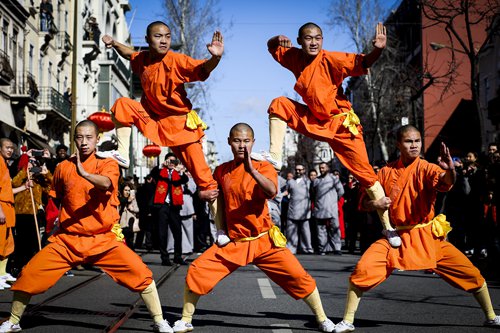
People take part in the Parade of the Chinese community living in Lisbon, as part of the Chinese New Year celebrations, in Lisbon, Portugal, on Saturday. Photo: IC
Crowds of men and women, old and young, lined the streets in downtown Lisbon on Saturday, on a sunny early-spring day, in a parade for the upcoming Chinese Lunar New Year.
Paraders assembled outside the Anjos Church before marching down Almirante Reis Avenue, one of Lisbon's main arteries. The procession then wound its way along Palma Street, now adorned with red lanterns, and into Martim Moniz Square, where a market and stage had been erected.
The Spring Festival gala, the fifth time it was being held in the same square, has become a platform for cultural exchange between China and Portugal.
"The dragons!" exclaimed 4-year-old Ana, when asked about her favorite part of the parade. She was busy filming the procession with her grandmother's camera.
"I bring Ana every year," said Maria Jose, Ana's grandmother. "It's such a happy day, especially when the sun shines like today."
The dancers dressed in pink, from the Zhengzhou Song and Dance Company, also caught the eye of Sara, also 4 years old, who had just started learning ballet.
"I work in the area, so I know the Chinese shops and often go for lunch in Chinese restaurants. I wanted to come and see the parade to find out a bit more about the culture, and it's been quite extraordinary," her father Tiago Rocha said.
Festival atmosphere
In a happy coincidence, Portugal's annual carnival falls in the same period as China's Spring Festival this year. Many Portuguese locals have made the most of the overlap by sporting Chinese masks and headwear.
Sara Fereira and Henrique Va were both wearing traditional Chinese dress with their baby daughter Carlona in a panda outfit. "My father is Chinese, but I was born in Portugal," Va said, "so today's perfect for me, I can combine the Chinese New Year with (the) carnival."
Ezequiel Warner was an American student on his holiday in Lisbon from Barcelona for the weekend. "When I came out of my hotel this morning I thought, 'Wow, this looks pretty cool!'" Warner said. "This is a new experience for me. I'm loving the dancing, the drumming, (and) the acrobatics."
Two Portuguese groups also participated in the event. The Evora Singing Group presented folk songs from the Alentejo, a region to Lisbon's south. Cante Alentejano, also known as the Alentejo song, is a song from a traditional Portuguese music genre, which is recognized as a UNESCO Intangible Cultural Heritage of Humanity.
"We preserve the cultural traditions of our region and people, principally through (the) Alentejo song, so it's an honor to participate in an event in which China does the same," said Francisco Silva, president of the Evora Singing Group.
Bring on the parade
China's Ambassador to Portugal, Cai Run, gave a speech before the performances.
"The parade has been going since 2014 and it has been a very positive exchange of cultures, deepening the ties between the two countries and bringing our two peoples closer," Cai said.
On top of the captivating performance of dragons, drummers, dancers, and the Shaolin Temple monks' martial arts displays, another interesting feature is the market. It featured handicrafts, food stalls, calligraphy workshops, Yanghe wine tasting and acupuncture.
Rui Candido was helping his young son Tomas learn to write Chinese characters. Candido is from Santarem, outside Lisbon, and knows Chinese culture well. "I visit China regularly (while) selling wines for the Quinta de Ribeirinha estate," he said. "I enjoy interacting with Chinese culture and I came along today because I wanted my kids to get to know the culture too."
The Spring Festival celebration in Lisbon, which features two days of stage performances is organized by the Association of Luso-Chinese Business and Industry, in conjunction with the Chinese Embassy in Portugal and Lisbon Town Hall.


